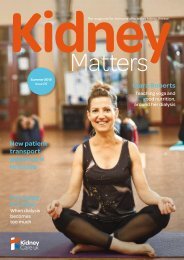Kidney Matters - Issue 12 Spring 2021
Kidney Matters is our free quarterly magazine for everyone affected by kidney disease. This issue includes a tribute to Kidney Care UK Chair of Trustees Professor Donal O'Donoghue who passed away due to covid-19 at the start of the year. There's also a feature on sex and relationships, how your views helped shape covid-19 national policy, medical articles on anaemia and simultaneous pancreas and kidney transplantation, and a feature interview with a transplant recipient on some of the social stigmas often faced by people with chronic health conditions within the Black, Asian and minority ethnic (BAME) community. As well as this, we'll be looking back at two years of the Kidney Kitchen as we cook up a tasty tandoori with guest chef and RNG dietitian, Gabby Ramlan.
Kidney Matters is our free quarterly magazine for everyone affected by kidney disease.
This issue includes a tribute to Kidney Care UK Chair of Trustees Professor Donal O'Donoghue who passed away due to covid-19 at the start of the year. There's also a feature on sex and relationships, how your views helped shape covid-19 national policy, medical articles on anaemia and simultaneous pancreas and kidney transplantation, and a feature interview with a transplant recipient on some of the social stigmas often faced by people with chronic health conditions within the Black, Asian and minority ethnic (BAME) community.
As well as this, we'll be looking back at two years of the Kidney Kitchen as we cook up a tasty tandoori with guest chef and RNG dietitian, Gabby Ramlan.
Create successful ePaper yourself
Turn your PDF publications into a flip-book with our unique Google optimized e-Paper software.
LEARN MORE
23
HD units from the UK were involved in PIVOTAL. It is
disappointing to see such inertia in response to good
data from a landmark UK trial,” comments Sunil.
What about ESAs?
Guidelines do not recommend treatment with ESA
unless anaemia persists after optimising iron levels.
When using ESA in CKD, Hb targets are 100-120 g/L.
These target levels are lower than recommended Hb
levels in healthy people (13.5-17.5 g/dL in men and
12.0-15.5 g/dL in women). This is because large studies
in the United States in dialysis patients with heart
disease and diabetic patients with CKD suggested
that using ESAs to raise Hb above 130 g/dL increases
cardiovascular risk, including the risk of stroke.
“In these studies patients were given high doses of
ESA, but not enough iron in many cases. The result was
very wide swings in ESA doses used, which may have
been one possible cause of the negative effects. In
contrast, there is increasing and reassuring safety data
when using intravenous iron alone to raise Hb levels—
indeed PIVOTAL showed this reduces cardiovascular
risk in dialysis patients,” says Sunil.
Lack of response to ESA may be resolved by switching
from a short-acting to a long-acting formulation. It
is also essential to check for underlying causes for
lack of response, including hyperparathyroidism, a
blood disease like myeloma, or chronic infection. It
is possible to develop antibodies to EPO, but this is
extremely rare.
“Sometimes we do not find out why a patient does
not respond to ESA and we must consider blood
transfusion, but this is a last resort. We want to
avoid the risk of developing antibodies in someone
who wants to have a transplant in the future. Blood
transfusion has other risks like infection and reactions
to the blood, and blood can be in short supply,
especially when there are fewer donations because of
Covid-19,” adds Sunil.
Conclusions
The best treatment for anaemia of CKD is a successful
kidney transplant, since it restores the body’s healthy
physical functioning. However, people still have CKD
after a transplant and, depending on the level of
kidney function, some may need treatment with iron
and ESA as needed.
“It is essential for doctors to follow guidelines and
check Hb regularly in people with CKD stages 3-5.
Anaemia develops slowly, so kidney patients adapt
and may not realise how ill they felt before their
anaemia is treated. PIVOTAL has also shown that
proactive iron infusion reduces cardiovascular risk
and reduces the dose of ESA in dialysis patients. In
future, novel drugs that help the body produce its own
EPO may further improve outcomes in anaemia of
CKD,” concludes Sunil.
Article by Sue Lyon
Freelance Medical Writer &
Editor, London
To find out more about anaemia
in chronic kidney disease visit
www.kidneycareuk.org/learn-more
Issue 12 | Spring 2021

















